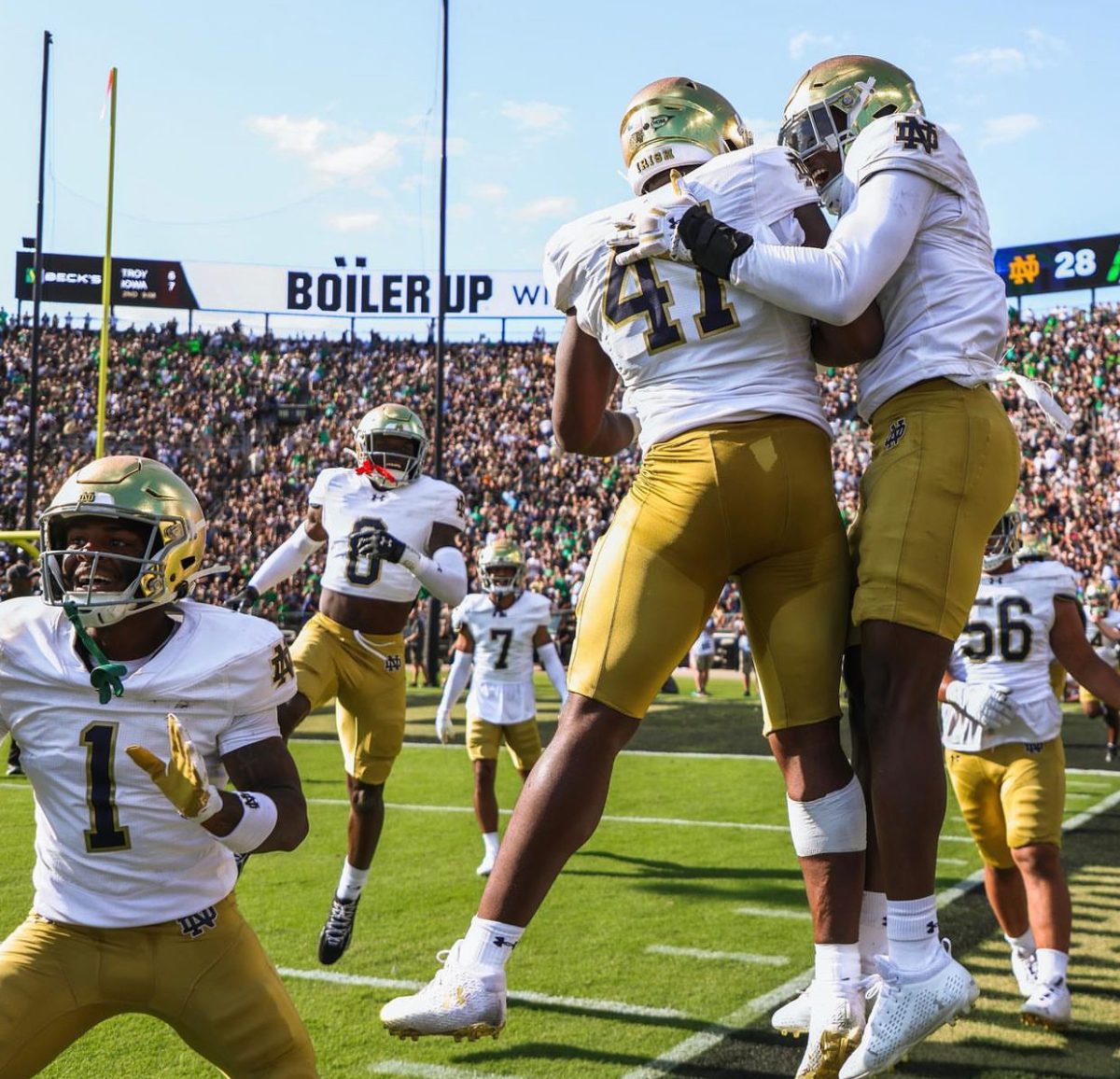The University of Notre Dame is conferenceless, and it might cost them their college football playoff hopes.
In week two of college football, the Notre Dame Fighting Irish paid $1.4 million to host the unranked Northern Illinois University Huskies at Notre Dame Stadium in South Bend, Ind. The Huskies shocked the Irish with a late field goal block, clinching a 16-14 victory, adding Notre Dame to their list of “Boneyard Victories.”
For most big teams in college football, an upset early in the season would be alarming, but ultimately, it would be a minor setback that may only cost them a couple of playoff seeds if they do well in conference play. After all, the new 12-team playoff format has an auto-bid for power-five conference winners. One small problem for Notre Dame, though: they aren’t in a conference.
After a national championship victory in 1988, the Fighting Irish were one of the biggest names in college football. In the early ’90s, when most prestigious football programs were signing television deals with their conferences, Notre Dame saw an opportunity to rake in the big bucks, signing a $38 million contract with NBC in 1991. The program has continued to sign new deals with NBC; in 2016, they signed a deal until 2025, reportedly earning the Irish $15 million yearly. While this money gets distributed to the student body, they would make more in a conference television deal. For example, in 2019, the Atlantic Coast Conference (ACC) distributed an average of $29.5 million to its 14 members. These numbers are staggering because the ACC pulls the lowest revenue out of the Power Five conferences. In 2024, 12 of the 14 Big Ten schools reportedly received $60.5 million in total revenue from the conference. Notre Dame gets an extra chunk of money from the College Football Playoff, which awards cash to independent schools yearly. Notre Dame is the highest earner, reportedly pulling in $28 million in the first five years of the playoffs despite only making one appearance. That money still doesn’t make it worth it monetarily for the university.
“There is no financial advantage to Notre Dame being independent in terms of operations… It costs us money. We would be much better off all in with the ACC or any Power 5 conference,” said Notre Dame Athletics Director Jack Swarbrick speaking to The Athletic in 2019. If Notre Dame has no financial incentive to stay independent, why do they do it?
It’s worth noting that Notre Dame has an “all-but-football” deal with the ACC, where they compete in the ACC in every sport but football (and ice hockey). While they have to schedule five games a year against ACC opponents, they have the freedom to play whoever they want outside of that obligation. This independence allows fans to see their team play new opponents each year. It provides excellent ratings for networks like ESPN and ABC, which capitalize on Notre Dame’s national pull, broadcasting the Fighting Irish multiple times a year. They also get to choose where they play, being the only team to play games in Chicago, Los Angeles and New York in a single season. These big market games undoubtedly play a role in Notre Dame’s valuation as Forbes’s second-biggest brand in college football. Notre Dame is also in no position to get cold feet on this deal because they are under contract with the ACC until at least 2037.
Notre Dame’s ability to choose its schedule, combined with its frequent high rankings on the preseason polls, has drawn much criticism from pundits as to why it continues to boast of its “prestigious” stature. “They have not won a national title since 1988. That is 36 years. 36 years ago, I was graduating from high school. I had an afro, [my] hairline was two feet forward,” said renowned pundit Stephan A. Smith on ESPN in February. According to ESPN, the Fighting Irish had the best chance to go undefeated out of any team in college football, with a 22.1% chance. Entering the season, they had a 66.1% chance of making the playoffs but now sit at a meager 31%. With Notre Dame’s aforementioned inability to secure an auto playoff bid due to their absence from a conference, the best shot they have is to win out, which would only give them a shot at the playoffs, given that they have to compete with other teams that have more challenging schedules down the stretch.
While the Fighting Irish could lose some national games if they decided to join up with a conference like the ACC, which would make the most sense given their current agreement, they would become the favorite to win the conference each year, giving Notre Dame football fans more playoff games, and returning Notre Dame’s championship reputation. Or they could join a conference like the Big Ten, which adds more competition but swings a much bigger payout. However, this may not be the case any time soon.
Swarbrick made way for Pete Bevecqua this season. “I feel better about our independence sitting here right now than I felt even when I first came into the role,” said Bevacqua when speaking to ESPN. “Independence is part of the DNA of Notre Dame football. I believe that vehemently.”






































































































































































































